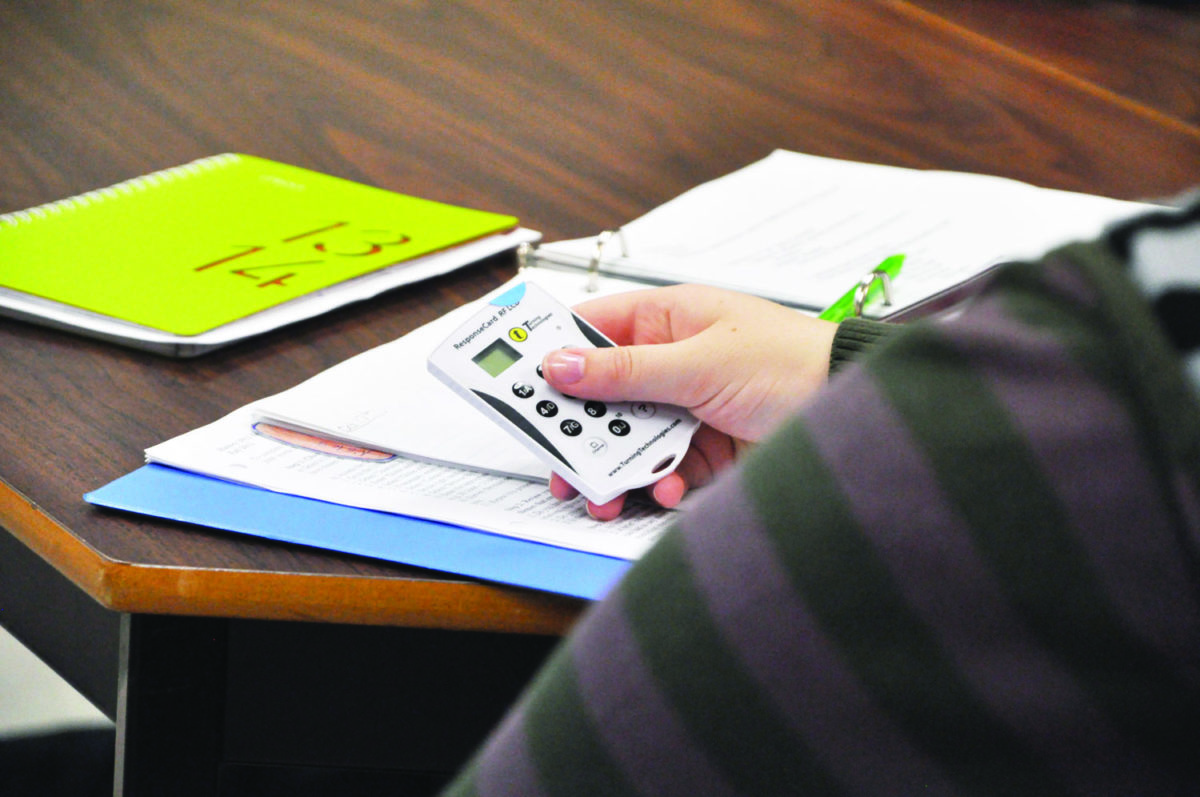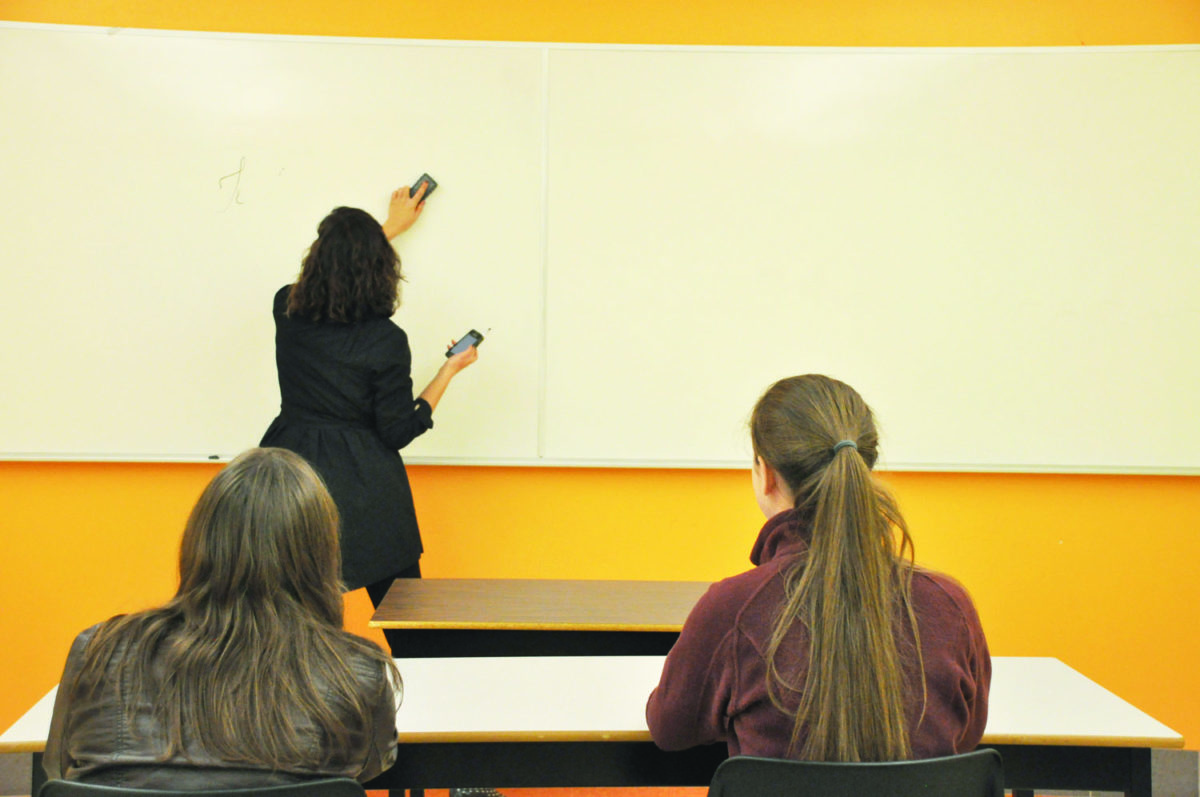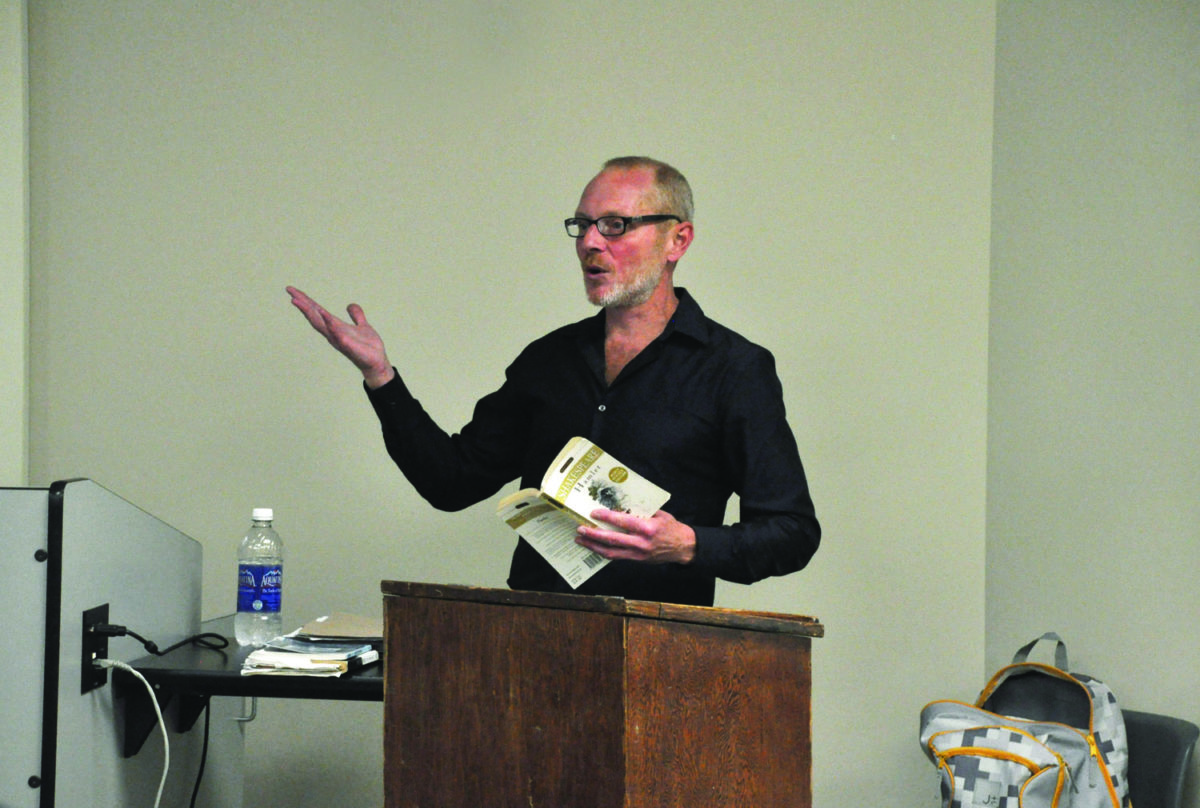
Embracing the future
STU has a new sociology professor and she’s jumping in the technology craze.
Gül Çalışkan started at STU in July and signed up for a clicker to use in her classes.
Two and a half years ago, James Whitehead brought a new technology to STU for professors to use in their classes. It’s a clicker-like device from Turning Technologies that allows professors to poll and quiz students about topics in class.
These clickers record marks and have the results immediately after the quiz is taken. It also can be anonymous so if a student doesn’t want to have their name tied to a certain opinion, they can still give their thoughts in class and see how many other people agree.
This year, three STU professors are using the clickers, Çalışkan, Michael Dawson in history and Kelly Bronson in science and technology studies.
Çalışkan decided to use the clicker for a variety of reasons. She only uses it in her introduction to sociology class, but her experience has been good so far and she hopes to use them in all her other classes in the future.
She said because this generation of students is so involved with technology, it’s a good idea to embrace the use of different technologies in class.
“Students are millennium students,” Çalışkan said. “They are so engaged with technology and it just speaks to them.”
She also said the clickers encourage participation in class so every student has a say instead of the same students contributing to the discussion every class.
“I know as a teacher that not speaking in class doesn’t mean they don’t have an opinion,” she said. “And this is a good way of diverging and encouraging them to participate gradually and feel comfortable to see how much they know.”
The clickers also act as a break in the lecture for students.
“I am a firm believer of lecturing, but [the clickers] break the lecture up,” said Çalışkan. “It just re-energizes students if after 20 minutes of lecture we do a clicker session. It gets everybody re-engaged.”
The main reason why she uses the clickers, though, is they encourage active learning.
“What I mean by that is that it enables me to see how much [students] got instantly,” Çalışkan said. “It also allows the students to see how much they got instantly as compared to the rest of the class.
“Then, it gives me a chance to see what was confusing. So, in that way it’s a very active teaching tool because you can instantly correct it.”
Due to the anonymity option for the clicker, Çalışkan can also ask personal questions to the class ranging from opinions on topics discussed in class to course evaluations.
Çalışkan said students seem to like the device and she hasn’t heard any negative feedback about it.
“They love it. Like I said, they are technology minded students so they like it.”


Placing limits
History professor Brad Cross uses and embraces technology, still realizes there are some limits.
He allows cell phones, laptops and tablets into his classes, but they must remain silent and put away, with the exception of those taking notes. Anyone using laptops or tablets must sit at the back.
This is a policy he only started this year.
“I had very vague language about electronics just to say to use them in the classroom in ways that are not disruptive,” Cross said. “This summer I read a piece in The Globe and Mail which was a small study in which these researchers saw the achievement levels of students sitting around people using laptops drop.”
Cross started getting concerned for students who are around people who use laptops in class and didn’t want to put anyone at a disadvantage just because they sit near a screen.
“I see this all the time,” Cross said. “I notice it in myself when I see a screen I’m drawn to look at it. So, none of this is intentional, but it just seems to be an outcome.”
Cross does occasionally ask a student to look something up in class and uses Moodle for his classes, but says students should not need to buy electronics to get through his classes.
He realizes that technology in the classroom is raising, especially with the use of clickers by his co-workers now, but Cross isn’t interested in that.
“I think some of it gets back to trying to establish a rapport with students where we can talk freely about topics,” Cross said. “There may be circumstances where people would like to be anonymous but I don’t think the way I teach and what I teach anonymity would give a different result or outcome.”
Cross uses technology largely to prepare for his classes and to help review. He thinks that would be the best option for students.
He also said technology is unreliable so it’s better to not be so dependent on it to get through the class time. He may feel better using technology for teaching if he knew it was going to work all the time.
“I appreciate all kinds of delivery methods,” said Cross. “But, for me, the day-to-day stuff that works best is the stuff I don’t have to rely on technology to do.
“There’s a lot of potential, I’m just much more interested in the conventional.”


Taking away the messiness
When John Muise started teaching English at STU, he was considered the odd one for using technology in class.
“I use movies and clips from films in my classes,” Muise said. “Back when I started, that was considered the latest thing for technology.”
Muise still uses film clips in class, but that’s about all he does. He never uses the internet and the only way to get a hold of him is to track him down on campus or call him at home.
He said this is because of how much technology interferes with how much we experience the world.
“When you’re getting a coffee or something with someone and you have your phone on the table, you’re essentially saying that if someone texts you, they’re more important [than the person you’re with],” said Muise.
“That’s just too disrespectful.”
Despite this, Muise doesn’t have a ban on cell phones or laptops in his classroom because he said it would be like having a “don’t pee on the floor” rule.
“I don’t pass judgement on people who have and use these devices,” Muise said. “But it’s just a simple respect thing.”
Muise said it isn’t his business to take away or stop someone from using technology. The reason why he doesn’t personally do it is because he likes speaking with people.
“Email can sound cold,” Muise said. “And it’s hard to show someone that you’re excited or empathetic or the like if you aren’t face-to-face or speaking on the phone.”
Muise said there are things people are missing out on in life because they’re too focused on whatever technology they have.
“It’s almost like you can’t tell people that they won’t die without [their cell phone or laptop],” Muise said. “This technology acts as a Linus blanket for everyone.”
He said there are ways to use technology in class and have it be beneficial, such as how George Street Middle School is doing it.
The school launched a pilot project for grade eight students this year called BYOD – bring your own device.
The project allows students to bring smart phones and laptops into class to learn about proper researching techniques and how to evaluate information found online.
But Muise also said that a break needs to be taken away from technology to go experience life.
“I don’t want to force people to stop using technology,” said Muise. “But if you’re constantly absorbed by it then you’re missing out on something.
“You’re missing out on the messiness of life because of these technologies.”
